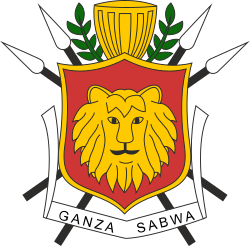| Mwami of Burundi | |
|---|---|
 | |
 | |
| Details | |
| Style | His Majesty |
| First monarch | Ntare III Rushatsi |
| Last monarch | Ntare V Ndizeye |
| Formation | c. 1680 |
| Abolition | 28 November 1966 |
| Residence | Gitega and Bujumbura, Burundi |
| Appointer | Hereditary |
| Pretender | Princess Rosa Paula Iribagiza |
This article contains two versions of the list of kings of Burundi, the traditional version before 1680 and the modern genealogy. The Kingdom of Burundi was ruled by sovereigns, titled mwami (plural abami), whose regnal names followed a cycle: Ntare (meaning 'lion'), Mwezi (meaning 'moon'), Mutaga, and Mwambutsa. Traditionally, it was thought that there had been four complete cycles but the modern genealogy indicates that there were only two complete cycles, starting with Ntare III Rushatsi.
Contents
In the 16th century, Burundi was a kingdom characterized by a hierarchical political authority and tributary economic exchange. A mwami headed a princely aristocracy ( ganwa ) which owned most of the land governing its subjects with superiority and required a tribute, or tax, from local farmers and herders who lived in forests. The Tutsi monarchy ruled the nation for centuries, but became largely ceremonial with the colonization of the nation by the German Empire in 1899. The kings continued to nominally rule through German and Belgian colonial periods, and the monarchy continued after the nation gained independence from Belgium in 1962. Burundi ceased to be a monarchy when King Ntare V Ndizeye was deposed by Prime Minister and Chief of Staff, Colonel Michel Micombero, who abolished the monarchy and declared a republic following the November 1966 coup d'état. [1] [2]




